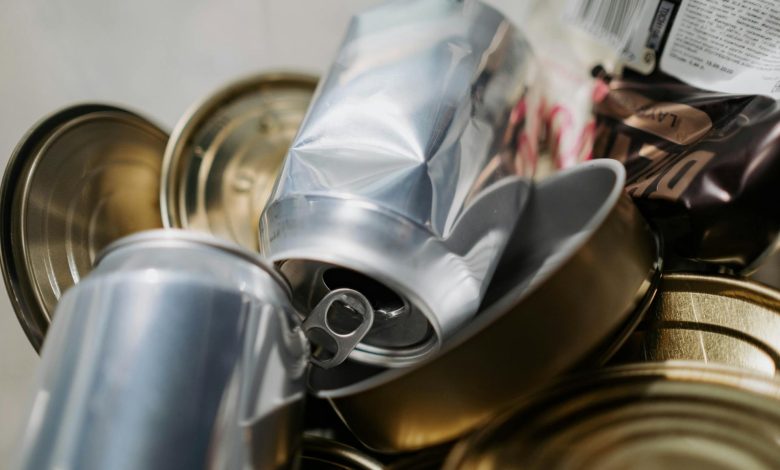
Recycling has been a crucial element of our efforts to become a more sustainable society for many years. From household waste all the way up to businesses and heavy industry, recycling is a whole of society effort that’s been extremely effective to date.
Recycling is so effective because it makes the production of new materials much less energy intensive, and demands very little new resources to create entirely new products. Producing aluminium products using recycled materials for example, requires up to 95% less energy than using new aluminium, and saves 14,000kWh of electricity per tonne1.
Industries like manufacturing are traditionally energy intensive and often have a larger impact on the environment than similarly sized businesses in different sectors. For these companies, reducing their carbon footprint, or even that of the entire industry, through simple methods such as recycling and waste reduction, can have an immensely positive impact.
But as we move into the era of widespread AI use however the main benefit of recycling, saving energy, could be undermined. If households and especially businesses, are utilising AI with increasing frequency, the additional energy expended could begin to overshadow the positive impact of their recycling efforts and they may see their carbon footprint begin to expand once again.
Estimates on AI’s energy consumption vary, but academic research can help to provide a more credible picture. A study from researcher Alex de Vries estimates that a service like ChatGPT consumes around 564,000 kWh of electricity per day ². To gain an insight into the scale of this, offsetting the daily energy consumption of this single AI service would require recycling approximately 2.8 million aluminium cans every single day. To offset the electricity consumed by a large AI model in just one minute, a business would need to recycle nearly 2,000 aluminium cans ³.
As the number of users continues to increase and AI becomes ever more common amongst businesses across a wide range of different industries, this number will continue to increase significantly.
For the individual user, the impact of a single AI query seems small but adds up. Research from Google and UC Berkeley estimates a single AI query consumes around 1 Watt-hour (Wh) of electricity ⁴. Recycling one aluminium can, meanwhile, saves about 200 Wh of energy. This means the energy saved by recycling a single can is effectively nullified after the creation of approximately 200 AI-generated emails.
For sustainability-minded businesses, this poses a problem. AI offers opportunities to improve productivity, efficiency, and growth. But it also creates a dilemma where businesses which rely heavily on AI could drastically increase their indirect energy consumption without being aware of the impact. For businesses and their employees, this energy use is out of sight and out of mind. Energy consumption by AI doesn’t happen in the office; it happens in massive, power-hungry data centres, often hundreds or thousands of miles away, but it is no less impactful.
For companies wanting to balance the benefits of AI whilst mitigating the negative impact, there are several courses of action to consider.
Promote Awareness of AI Energy Consumption
Company employees may not be aware that AI has these hidden energy costs. Raising awareness of how AI’s environmental impact works can have a positive effect on when and why employees may choose to use it.
An individual who understands that unnecessary actions have an environmental cost may reduce how often they rely on AI, in turn reducing the company’s indirect environmental footprint.
Continue to implement sustainable waste reduction policies
Company waste reduction initiatives are still a hugely important part of creating a sustainable business. Whether it’s recycling or material conservation, reducing the amount of materials that go to waste goes a long way to making a company more sustainable as a whole.
This is particularly true for industries that rely on energy intensive production for the materials they use. Creating steel or aluminium from scratch for example is a process that consumes large amounts of energy, which can be drastically reduced through recycling.
Taking steps to procure materials from more sustainable sources, reusing or recycling as much waste product as possible, and reducing the amount of waste created by each product or sale, can all help to create a more sustainable model for material usage.
Conduct an audit on AI use
Responsible AI use can be a benefit for businesses, and when targeted correctly it can even make a business more efficient and less wasteful.
Conducting an audit on how AI is used within your business can help you to reduce reliance on it in the areas where it is not useful, helping you to cut down on wasteful usage. However, it can also help you to identify areas where it is genuinely useful, helping to improve employee productivity and increase company efficiency.
Utilise AI to reduce inefficiency
AI should be used to enhance efficiency, and businesses should resist the temptation to simply delegate large portions of work to AI that would be better done by human workers.
Instead, identify menial tasks which consume time and prevent your workforce from focusing on more important jobs, and automate these to free up employee capacity to tackle more impactful tasks. Similarly, consider using AI to identify areas of duplication or unnecessary excess work, which can be removed to free up time and resources, as well as reducing unneeded energy consumption.
Conclusion
Being a sustainably minded business does not mean that AI should be ignored, in fact it can be a genuine driver towards improved sustainability. But it shouldn’t be forgotten that AI is an energy intensive tool with a very real and potentially damaging environmental impact.
That’s why businesses and employees alike should begin to develop good habits at this early stage, to encourage careful and responsible AI use in a way that does not pose a major threat to the environment.

